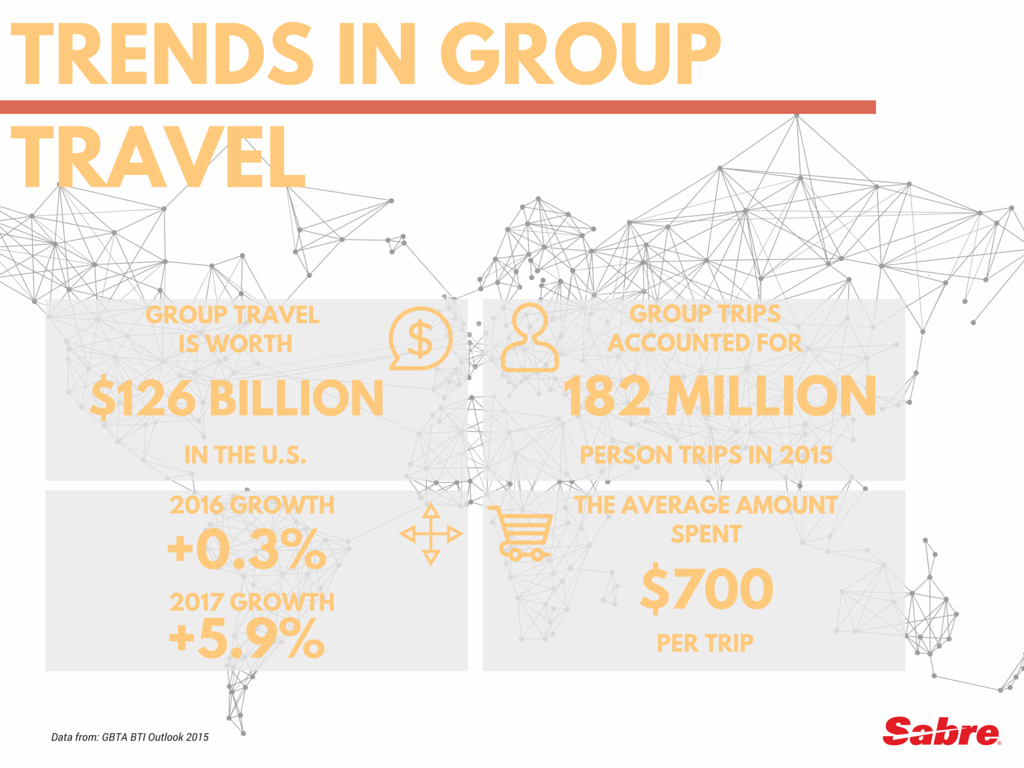[full group travel graphic here]
In the U.S., nearly one in three hotels is booked as part of a group block. Travel managers and suppliers that handle groups with minimal friction are most likely to enjoy repeat business. This is especially true with high-value customers such as business travelers and meeting planners.
Group bookings are often challenging. Each group has its own dynamics. Group travel often includes travelers representing different demographics within affinity groups. In fact, a significant number of leisure trips are sold to groups:

TNS TravelsAmerica found that forty-five percent of Millennials’ leisure trips in 2014 were with other adults, with other adults joining fifty-nine percent of Boomers’ trips.There’s also a sizable business group travel market. From small meetings to incentive travel to powerhouse conferences and tradeshows, business groups are lucrative. GBTA pegs total spending on group business travel in North America at $126.4 billion in 2015. That spending was flat throughout 2015, with only a slight increase expected in 2016. Rather than retrench, this is the time for travel suppliers and managers to grab market share. There is a common thread between leisure and business travelers. Whether relaxation or revenue, all groups seek a productive journey. They also want an experience that starts with the least amount of pre-trip hassle. By minding the Ps and Ts of group travel, suppliers can deliver on the group traveler’s expectations.
Technology + process = group success
The ability to serve groups well is tied to both technology and process. First, it’s about ensuring that the technology can handle the unique needs of a group. Second, processes must be reliable and repeatable. The group should experience consistent customer service across all its members. Increasing revenue from groups is about finding the right equation between technology and process. For agencies, the opportunity to manage larger groups is quite lucrative. To meet client demands, travel management companies want enhanced visibility into meeting spend. TMCs also need tools to efficiently book flights, hotels and meeting space for clients. Through passive PNRs, TMCs can build in a deeper understanding of spend. Agencies can capitalize on the complexities of groups, says Keren Bronher, Sabre Product Development Manager for Groups:“Group booking is time consuming. Travel agents have an opportunity to gain customer loyalty and satisfaction with good service and a flawless trip.”For both hotels and airlines, the reality is that the majority of these group bookings manual. This means dedicating staff to basic tasks such as name changes, personal preferences, and other changes. On the supplier side, it’s a problem when a group organizer gets no response because the supplier is overwhelmed with requests. Through technology and process, groups can be served better and faster. Technology frees up staff with automated self-service tools. Process increases traveler satisfaction through swifter response times, especially since group sales are often still managed offline, says Bronher:
“Selling groups is complex and labor intensive. Each carrier has its own booking solution which can vary from market to market. Group requests are made in advance via phone, fax, e-mail, or on a per-request basis with the airlines.”Self-service technology can, in some cases, help hotels increase productivity with existing staff resources. Self-service is critical to increasing both guest satisfaction and house profit. This is especially true since more groups are being booked by the traveler, says Charles de Gaspe Beaubien, CEO of Groupize:
“The traveler is more non-professional. Ten years ago, there were more agents and meeting planners. Now, it’s more the admins in business and the bride or coach in the leisure side that do these bookings.”The picture is even more complicated when it comes to meetings. Only 20 percent of hotels have a digital system for sales and catering. And even when they do, the meeting space is yield-managed; it’s tied to room and food/beverage spend. Hotels want to leverage this meeting space a way to sell rooms, which further complicates the process. Regardless of limitations, As de Gaspe Beaubien reminds all hotels, “speed wins groups.” Success with groups is about supporting a smart process with effective technology. There’s a real opportunity to combine process and technology to capture a larger share of the profitable group travel segment.

